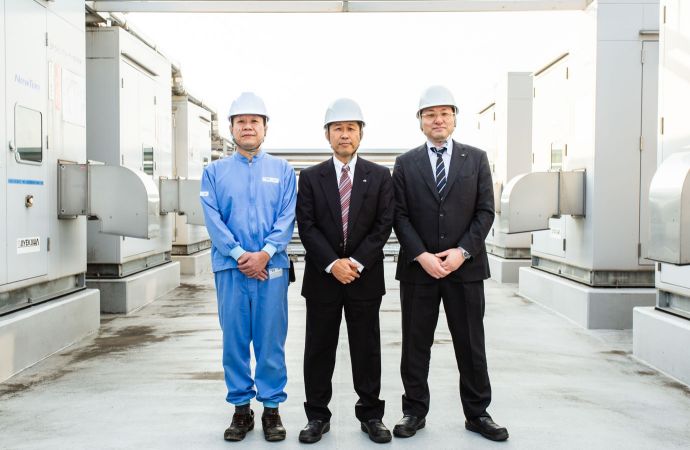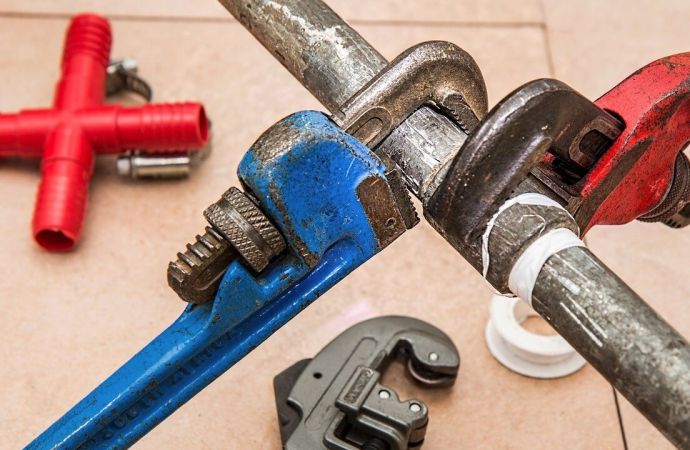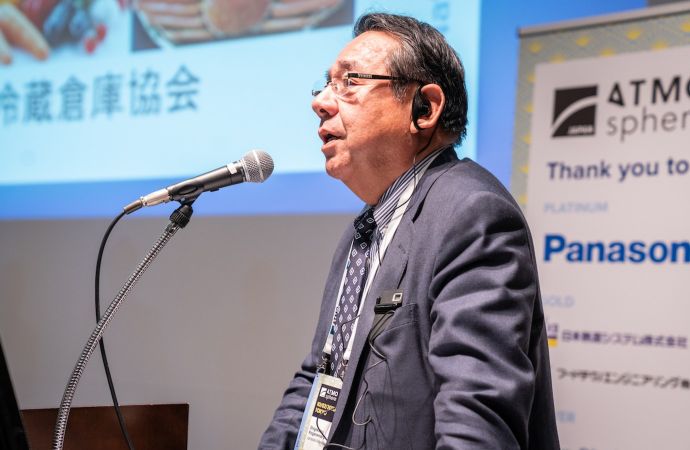Ajinomoto Frozen Foods aims to eliminate the use of Freon from all its domestic food processing factory freezers by 2020.

The Ajinomoto Frozen Foods management team in front of Mayekawa's NH3/CO2 refrigeration systems at its factory in Gunma, Japan.
Signalling Japanese end users' continuing move towards natural refrigerants, Ajinomoto Frozen Foods Co., Ltd. recently installed several of Mayekawa's NH3/CO2-based NewTon refrigeration systems at its frozen food processing facility in Gunma, Japan.
The Ajinomoto Group conducts R&D, manufacturing and sales of frozen food items in Japan as well as Europe, Asia and North America.
Ajinomoto Frozen Foods is a division of the Japanese multinational Ajinomoto Co., Inc. — a food and amino science corporation best known for creating the original monosodium glutamate (MSG) product branded 'AJI-NO-MOTO'.
This website recently toured the company's Gunma facility, where it uses the NH3/CO2 refrigeration systems in the product freezing process for several food items it sells, including the Japanese dumplings commonly referred to as 'gyoza'.

Natural refrigerants play a key role in the company's sustainability initiatives.
Ajinomoto Frozen Foods plans to completely eliminate the use of Freon, replacing it with natural refrigerant-based systems, in all its domestic food processing factory freezer systems by 2020.
"Freezers using fluorocarbons will be eliminated from production plants by 2020," the company states in its official Corporate Profile document.
"Ajinomoto Frozen Foods is the only company in the industry that has promised to eliminate them."
As of December 2018, the company has installed 23 natural refrigerant-based systems at its seven domestic factories.
Some of these installations were supported by Japanese government subsidies for natural refrigerant installations — which will continue into 2019.
By 2020, the company plans to install or retrofit seven more natural refrigerant-based systems.
Overseas, it operates a factory in Thailand which uses ammonia systems as well as a factory in China which uses ammonia.
In addition to food processing freezers, Ajinomoto Frozen Foods also operates a large number of their own refrigerated cold storage warehouses.
The company aims to eliminate the use of Freon at those facilities as well in the future.
To date, it has already installed and begun testing transcritical CO2 systems from Japanese manufacturers, Nihon Netsugen Systems (NNS) and Mitsubishi Heavy Industries Thermal Systems Co. Ltd (MHI) at two of its cold storage facilities in Japan.
Hear more from Ajinomoto Frozen Foods at the upcoming ATMOsphere Japan 2019 conference, where Executive Officer Tomomitsu Yamasaki will speak about the company's use of natural refrigerants alongside other end users such as Lawson, the Japanese Consumer's Co-Operative Union (JCCU), Metro Cash & Carry Japan, the Daisen Nyugyo Agricultural Cooperative Association, and the Japan Association of Refrigerated Warehouses.
ATMOsphere Japan 2019 will be held in Tokyo, Japan on 12 February 2019.
See the latest programme here.
Related stories






